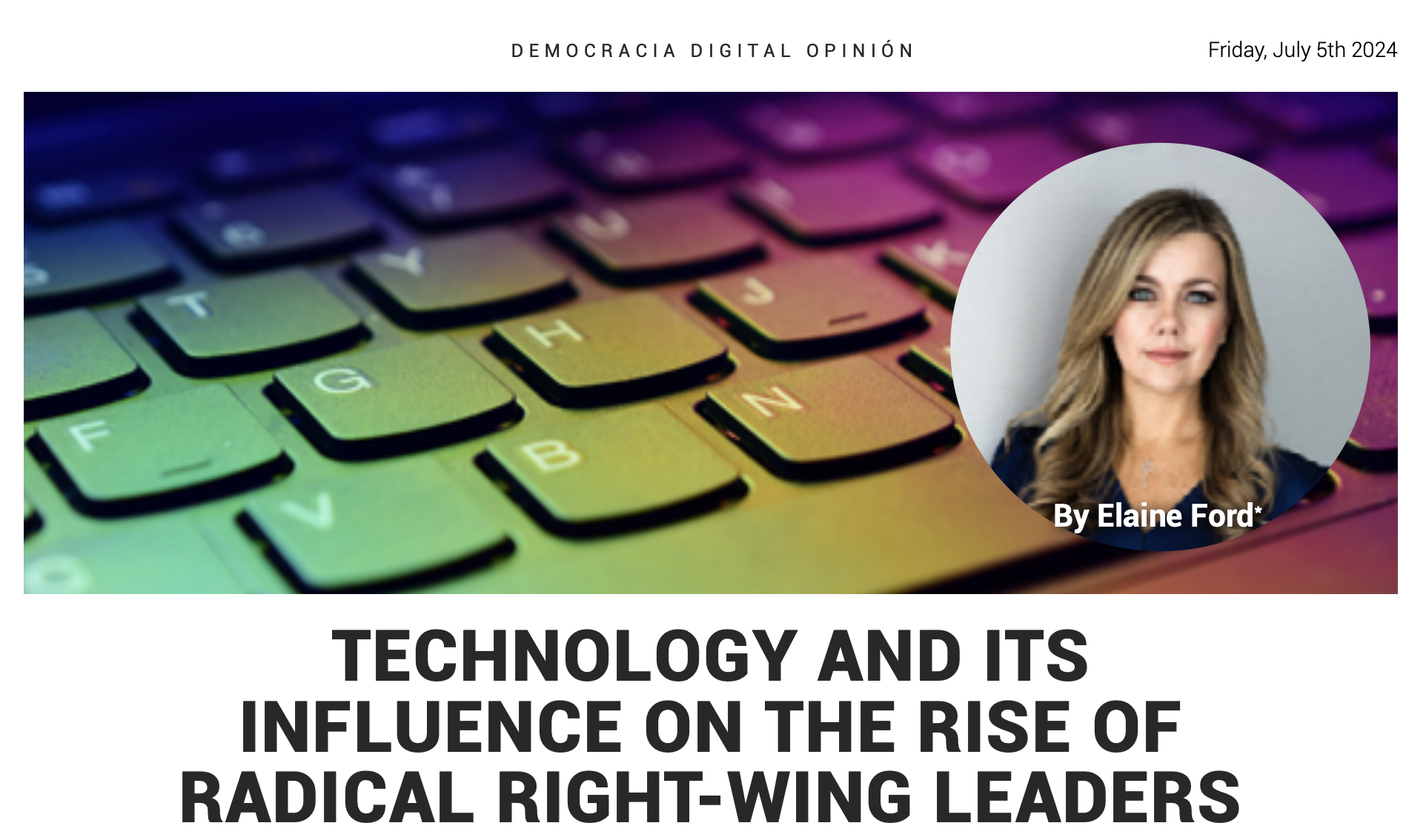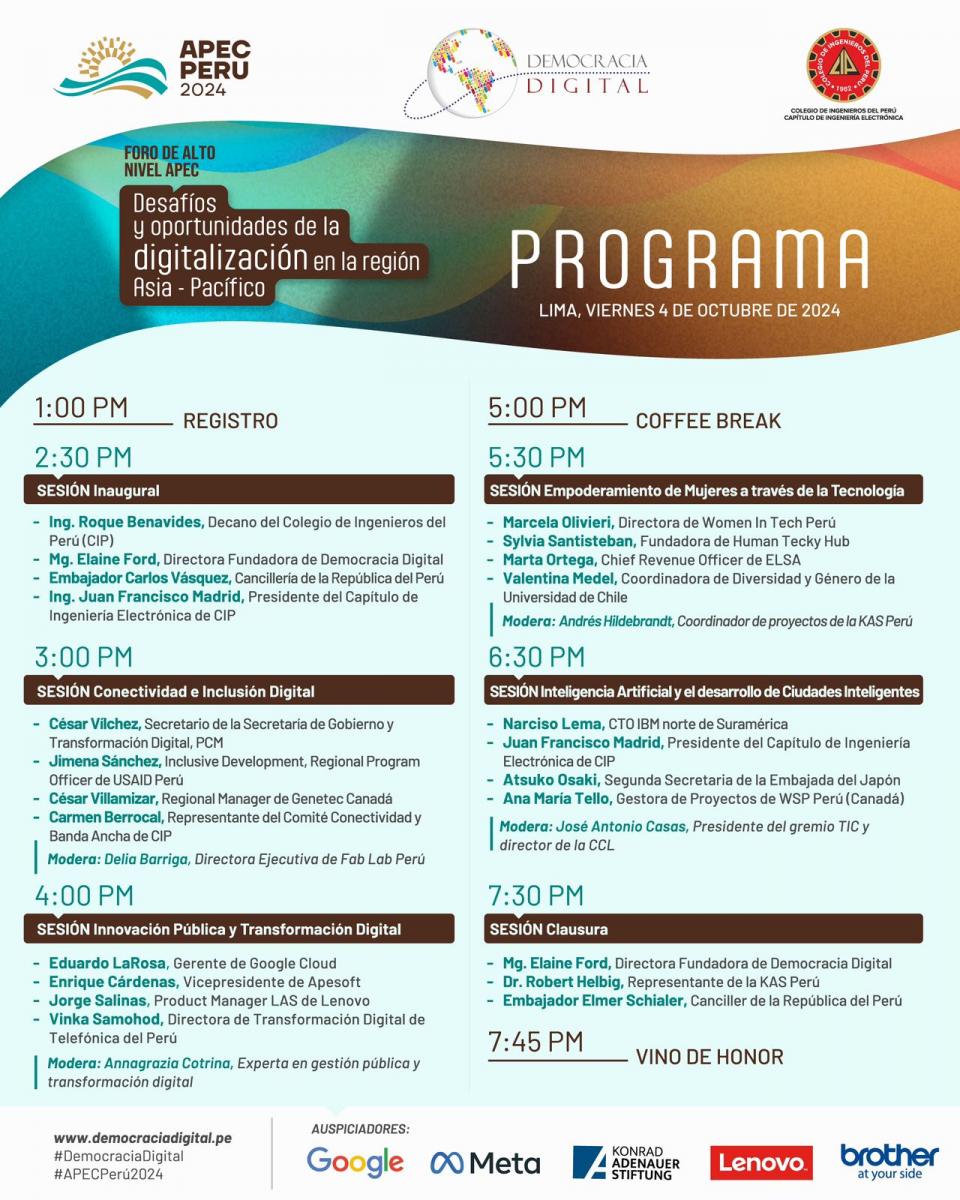ARTICLE | Technology and its Influence on the Rise of Radical Right-Wing Leaders

By Elaine Ford*
In recent years, we have witnessed the emergence of new leaders—charismatic, populist figures who are ideologically positioned on the right wing. These new actors, with their eloquent and exaggerated rhetoric, challenge the status quo and captivate those disenchanted with traditional politics. Traditional politics, which has generated significant disillusionment among the population, has led to only 28% of the population in Latin America being satisfied with democracy, according to the latest Latinobarómetro.
This figure, unfortunately, no longer surprises us because it has been declining in recent years following continuous deterioration. This is also confirmed by the latest The Economist Index, which categorises most countries in the region as “flawed democracies.”
This complex scenario is compounded by the incessant technological revolution we are experiencing. Along with its great attributes, digital and emerging technologies have also altered the traditional way of doing politics. Today, it is impossible to imagine a political actor not participating on social media. Online spaces have become the best areas for politicians to deliberate, share their proposals, interact with voters, gain electors, and amplify their messages, among other very positive actions for political campaigns. This, of course, also comes amid online misinformation, polarisation, hate speech, and harmful practices that often turn digital spaces into unreliable, violent, and insecure environments.
Twitter, now X, has been the quintessential platform for the political arena and for the rise of right-wing leaders with radical discourses. Just remember the use Jair Bolsonaro made of it in the 2018 Brazilian electoral campaign, as well as Donald Trump during his 2016 presidential election up until January 2021. Both leaders increased their popularity through constant use of Twitter, where they maintained millions of followers. There, they shared public interest information along with incendiary narratives, sometimes very questionable in terms of content accuracy.
Presidents Nayib Bukele and Javier Milei, in El Salvador and Argentina, respectively, have also shown great affinity for this same social network. Bukele’s regime, in power since 2019, is considered authoritarian but very popular, having been re-elected with almost 85% of the vote earlier this year. His youth and his strong inclination towards social media facilitated a digital campaign to build a political figure and capture millions of followers. Subsequently, he has used posts on X to govern, giving instructions to his government team.
Milei, in Argentina, won the elections in November 2023 with a renewed but controversial and confrontational discourse towards traditional politicians. It is estimated that he spends three hours a day on X interacting with his followers, where he built his media image and managed to win over a large mass of young people and citizens disillusioned with previous governments. With over three million followers, he is currently the president in the region who has posted the most on this social network, surpassing 246,000 posts.
Regarding the far-right, I recently participated in a talk at the Oxford Internet Institute in the United Kingdom, on the eve of the European Parliament elections, where various academics analysed the participation of far-right candidates on social media. Particularly interesting was the work done by Dr. Donatella Bonansinga, a researcher at University College London, who showed the use of TikTok by Marine Le Pen, leader of the French party National Rally, and Matteo Salvini, leader of the Italian party League.
Both politicians, with thousands of followers, showed the more human side of their daily lives through TikTok videos, for example, buying flowers or playing with children. In this way, they broke the negative image that exists in the collective imagination, built on stereotypes and prejudices against the far right. Could the use of TikTok and this type of interaction be a factor influencing the recent results that show a strong positioning of the far right in Europe?
These facts and figures are significant, as they coincide with the recent findings of the 2024 Reuters Institute Digital News Report, which indicates that new platforms and video formats are gaining more interest among young audiences, becoming important sources for online news. The use of TikTok has shown consecutive growth, with 23% of 18-24 year old using it to consume news. Similar situations occur with Instagram reels and YouTube formats.
Therefore, in light of this, it is worth asking whether this behaviour among right-wing leaders constitutes trends or are simply styles that have achieved great results in politics. Undoubtedly, the use of social media and other technologies has been and will continue to be decisive for the rise of new political leaderships. Their strategic use according to local circumstances and contexts is crucial, and clearly, some know how to utilise it better than others, as demonstrated by the cases described.
Success in using these tools adds, on one hand, to the narratives, charisma, and popularity of the candidate and, on the other hand, to external factors related to the electorate's profile, rival candidates, and the political, economic, and social stability of the country at stake.
In a global electoral year like 2024, it is crucial to observe how these digital tools are managed. Ideally, political leaders should maximise their potential and build online spaces where respect, tolerance, plurality of ideas, and deliberation prevail, thus contributing to restoring trust in our politicians, institutions, and especially our democracies.
------
* Elaine Ford is the founding director of Democracia Digital in Peru and Latin America. She is an international speaker, TEDx speaker, and co-author of various books, including "The Challenge of Digital Democracy: Towards an Interconnected Citizenship" (2019). @elaforde

